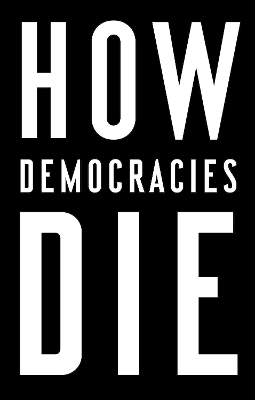
How Democracies Die
Crown Publishing Group, Division of Random House Inc (Verlag)
9781984825773 (ISBN)
WINNER OF THE GOLDSMITH BOOK PRIZE • SHORTLISTED FOR THE LIONEL GELBER PRIZE • NAMED ONE OF THE BEST BOOKS OF THE YEAR BY The Washington Post • Time • Foreign Affairs • WBUR • Paste
Donald Trump’s presidency has raised a question that many of us never thought we’d be asking: Is our democracy in danger? Harvard professors Steven Levitsky and Daniel Ziblatt have spent more than twenty years studying the breakdown of democracies in Europe and Latin America, and they believe the answer is yes. Democracy no longer ends with a bang—in a revolution or military coup—but with a whimper: the slow, steady weakening of critical institutions, such as the judiciary and the press, and the gradual erosion of long-standing political norms. The good news is that there are several exit ramps on the road to authoritarianism. The bad news is that, by electing Trump, we have already passed the first one.
Drawing on decades of research and a wide range of historical and global examples, from 1930s Europe to contemporary Hungary, Turkey, and Venezuela, to the American South during Jim Crow, Levitsky and Ziblatt show how democracies die—and how ours can be saved.
Praise for How Democracies Die
“What we desperately need is a sober, dispassionate look at the current state of affairs. Steven Levitsky and Daniel Ziblatt, two of the most respected scholars in the field of democracy studies, offer just that.”—The Washington Post
“Where Levitsky and Ziblatt make their mark is in weaving together political science and historical analysis of both domestic and international democratic crises; in doing so, they expand the conversation beyond Trump and before him, to other countries and to the deep structure of American democracy and politics.”—Ezra Klein, Vox
“If you only read one book for the rest of the year, read How Democracies Die. . . .This is not a book for just Democrats or Republicans. It is a book for all Americans. It is nonpartisan. It is fact based. It is deeply rooted in history. . . . The best commentary on our politics, no contest.”—Michael Morrell, former Acting Director of the Central Intelligence Agency (via Twitter)
“A smart and deeply informed book about the ways in which democracy is being undermined in dozens of countries around the world, and in ways that are perfectly legal.”—Fareed Zakaria, CNN
Steven Levitsky and Daniel Ziblatt are Professors of Government at Harvard University. Levitsky’s research focuses on Latin America and the developing world. He is the author of Competitive Authoritarianism and is the recipient of numerous teaching awards. Ziblatt studies Europe from the nineteenth century to the present. He is the author, most recently, of Conservative Parties and the Birth of Democracy. Both Levitsky and Ziblatt have written for Vox and The New York Times, among other publications.
We tend to think of democracies dying at the hands of men with guns. During the Cold War, coups d'état accounted for nearly three out of every four democratic breakdowns, and more recently, military coups toppled Egyptian President Mohamed Morsi in 2013 and Thai Prime Minister Yingluck Shinawatra in 2014. In these cases democracy dissolved in spectacular fashion, through military power and coercion. But there is another way to break a democracy. It is less dramatic but equally destructive. In Venezuela, for example, Hugo Chávez was a political outsider who railed against what he cast as a corrupt governing elite, promising to build a more "authentic" democracy that used the country's vast oil wealth to improve the lives of the poor. Skillfully tapping into the anger of ordinary Venezuelans, many of whom felt ignored or mistreated by the established political parties, Chávez was elected president in 1998. As a woman in Chávez's home state of Barinas put it on election night, "Democracy is infected. And Chávez is the only antibiotic we have." When Chávez launched his promised revolution, he did so democratically. In 1999, he held free elections for a new constituent assembly, in which his allies won an overwhelming majority. It wasn't until 2003 that Chávez took his first clear steps toward authoritarianism, stalling a referendum that would have recalled him from office. In 2004, the government blacklisted those who had signed the recall petition and packed the supreme court. The chavista regime grew more repressive after 2006, closing a major television station, arresting or exiling opposition politicians, judges, and media figures on dubious charges, and eliminating presidential term limits so that Chávez could remain in power indefinitely. After Chávez's death a year later, his successor, Nicolás Maduro, won another questionable reelection. It was only when a new single-party constituent assembly usurped the power of Congress in 2017, nearly two decades after Chávez first won the presidency, that Venezuela was widely recognized as an autocracy. This is how democracies now die. Blatant dictatorship-in the form of fascism, communism, or military rule-has disappeared across much of the world. Military coups and other violent seizures of power are rare. Most countries hold regular elections. Since the end of the Cold War, most democratic breakdowns have been caused not by generals and soldiers but by elected governments themselves. Like Chávez in Venezuela, elected leaders have subverted democratic institutions in Georgia, Hungary, Nicaragua, Peru, the Philippines, Poland, Russia, Sri Lanka, Turkey, and Ukraine. Democratic backsliding today begins at the ballot box. How vulnerable is American democracy to this form of breakdown? The foundations of our democracy are certainly stronger than those in Venezuela, Turkey, or Hungary. But are they strong enough? Answering such a question requires stepping back from daily headlines and breaking news alerts to widen our view, drawing lessons from the experiences of other democracies around the world and throughout history. We know that extremist demagogues emerge from time to time in all societies, even in healthy democracies. The United States has had its share of them, including Henry Ford, Huey Long, Joseph McCarthy, and George Wallace. An essential test for democracies is not whether such figures emerge but whether political leaders, and especially political parties, work to prevent them from gaining power in the first place-by keeping them off mainstream party tickets, refusing to endorse or align with them, and when necessary, making common cause with rivals in support of democratic candidates. Once a would‑be authoritarian makes it to power, democracies face a second critical test: Will the autocratic leader subvert democratic institutions or be constrained by them? America failed the first test in November 2016, whe
| Erscheinungsdatum | 02.01.2019 |
|---|---|
| Verlagsort | New York |
| Sprache | englisch |
| Maße | 104 x 172 mm |
| Gewicht | 198 g |
| Themenwelt | Geschichte ► Allgemeine Geschichte ► Neuzeit (bis 1918) |
| Sozialwissenschaften ► Politik / Verwaltung ► Politische Systeme | |
| Sozialwissenschaften ► Politik / Verwaltung ► Politische Theorie | |
| Sozialwissenschaften ► Politik / Verwaltung ► Staat / Verwaltung | |
| Schlagworte | 2016 election • american government and politics today • ap government and politics 2018 • authoritarianism • barack obama • Bestseller • Democracy • democracy in America • dictator • Donald Trump • Fascism • Geopolitics • gifts for history buffs • Government • History books • history gifts • history lovers gifts • Mitch McConnell • New York Times Bestseller • Nonfiction • political books • Political Science • political science books • Political Tribes • Politics • resistance • Trump • Trump book • trump books • trumpocracy • United States • World Politics |
| ISBN-13 | 9781984825773 / 9781984825773 |
| Zustand | Neuware |
| Informationen gemäß Produktsicherheitsverordnung (GPSR) | |
| Haben Sie eine Frage zum Produkt? |
aus dem Bereich


